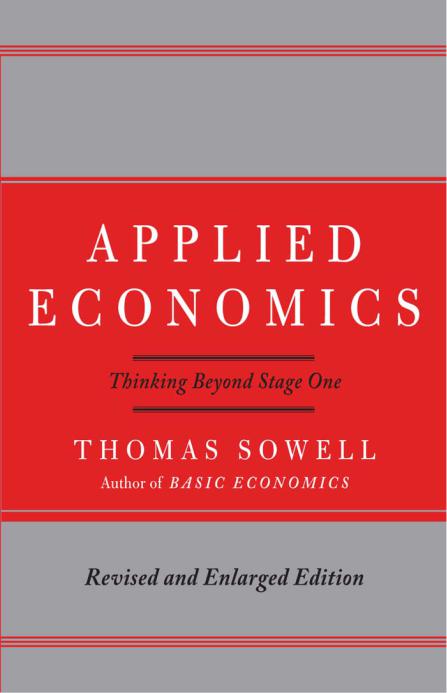
Sowell Applied Economics Thinking Beyond Stage One (revised and enlarged ed)
.pdf

A P P L I E D
E C O N O M I C S

A P P L I E D
E C O N O M I C S
Thinking Beyond Stage One
THOMAS SOWELL
Revised and Enlarged Edition
A Member of the Perseus Books Group
New York
Copyright © 2004, 2009 by Thomas Sowell
Published in 2009 by Basic Books,
A Member of the Perseus Books Group
First edition published in 2004 by Basic Books
All rights reserved. Printed in the United States of America. No part of this book may be reproduced in any manner whatsoever without written permission except in the case of brief quotations embodied in critical articles and reviews. For information, address Basic Books, 387 Park Avenue South, New York, NY 10016-8810.
Books published by Basic Books are available at special discounts for bulk purchases in the United States by corporations, institutions, and other organizations. For more information, please contact the Special Markets Department at the Perseus Books Group, 2300 Chestnut Street, Suite 200, Philadelphia, PA 19103, or call (800) 810-4145, ext. 5000, or e-mail special.markets@perseusbooks.com.
A CIP catalog record for this book is available from the Library of Congress.
ISBN-13: 978-0-465-00345-7
LCCN: 2008932670
10 9 8 7 6 5 4 3 2 1

To Professor Arthur Smithies, who taught
me to think beyond stage one
iii
This page intentionally left blank

C O N T E N T S
Preface |
vii |
|
1 |
Politics versus Economics |
1 |
2 |
Free and Unfree Labor |
20 |
3 |
The Economics of Medical Care |
53 |
4 |
The Economics of Housing |
95 |
5 |
Risky Business |
133 |
6 |
The Economics of Immigration |
171 |
7 |
The Economics of Discrimination |
207 |
8 |
The Economic Development of Nations |
238 |
Sources |
275 |
|
Index |
319 |
|
v

This page intentionally left blank

P R E FAC E
This is the revised and expanded edition of Applied Economics. There is a new chapter on the economics of immigration, and existing chapters have much new material, such as an analysis of the economics of organ transplants in the chapter on the economics of medical care and an explanation of some of the “creative financing” behind the subprime
mortgage crisis in the chapter on the economics of housing.
Despite its title, this is not a book designed for economists to use in applying their expertise. It is a book to enable anyone, with no prior knowledge of economics, to understand some of the key economic issues of our time— medical care, housing, discrimination, and immigration, for example. Because these are political, as well as economic issues, we will need to consider what incentives and constraints apply to political decisionmaking, as well as those which apply to economic decision-making.
Economics requires thinking beyond the immediate consequences of decisions to their long-term effects. Because politicians seldom look beyond the next election, it is all the more important that voters look ahead— beyond stage one— rather than voting for a candidate or a policy that they will end up regretting later. This book stresses long-run repercussions to decisions and policies.
It is helpful to have something of a sense of humor when considering economic policies. Otherwise, the study of these policies and their often painful, and sometimes disastrous, unintended consequences can get to be too depressing or you can get too angry. Save your anger until you are inside the voting booth on election day. In the meantime, enjoy the process of getting more understanding of issues and institutions that affect your life and the future of the country.
Because this is a book for the general public, the usual footnotes or endnotes are omitted. However, for those readers who want to verify what is said here, or to read further on some of the subjects covered, the sources of the many facts discussed here are listed in the back of the book. Many, if
vii

Applied Economics
not most, of those facts were gathered for me by my extraordinary research assistants, Na Liu and Elizabeth Costa. The former also created the computer files from which this book was directly printed and the latter did the copy-editing.
THOMAS SOWELL
The Hoover Institution
Stanford University
viii
